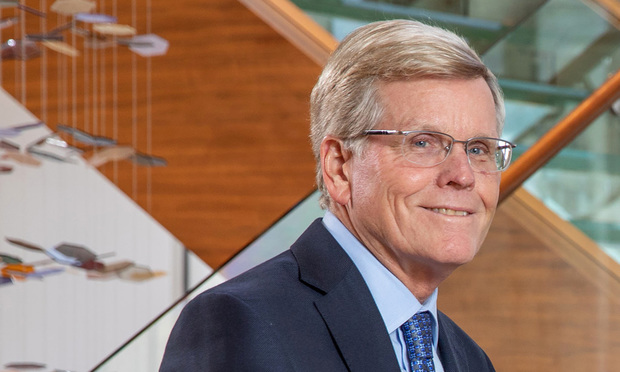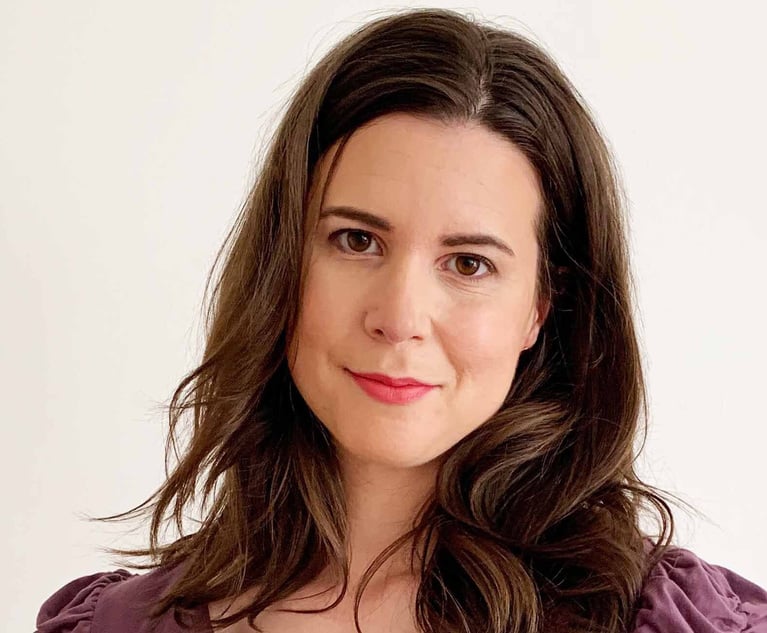Tested Vietnam Veterans Win Medical Care
"Quite frankly, for that office to stay with it all these years and keep fighting for us, I guess I can't say enough about them. They've been wonderful." — Bill Blazinksi
April 30, 2018 at 02:00 AM
3 minute read

This article is part of National Law Journal's 2018 Pro Bono Hot List recognition package that celebrates law firms that do well by doing good. See the other stories here.
Bill Blazinski entered Edgewood Arsenal in 1968—the middle of the Vietnam War.
During Blazinski's 60 days in the U.S. Army facility, he said he was locked in chambers filled with tear gas as his eyes watered and his skin burned. Twice, he said, he was given drugs without being informed of their long-lasting effects.
He and the thousands of other American soldiers tested at Edgewood were bound to silence, even as health complications, including cancer, began to emerge. They were left with no medical care, and no options.
Then came Gordon Erspamer. The Morrison & Foerster lawyer's own father had passed away due to the lingering effects of war-test radiation, and his father, too, was denied medical care. So in 2009, Erspamer filed a case on behalf of Vietnam vets against the CIA and other government entities, seeking medical care for those with conditions were linked to testing at Edgewood.
“Gordy was literally a legend in the veterans' community,” said Michael Blecker, a Vietnam veteran and the executive director of veterans group Swords to Plowshares, who co-filed the suit.
After Erspamer's passing in 2014, MoFo partner James Bennett took up the case, alongside Ben Patterson and Stacey Sprenkel who were already involved. Last year, after a nearly nine-yearlong court battle, the U.S. District Court for the Northern District of California ordered the Army to provide test victims medical care. Last month, the first veteran applied for care.
Earlier rulings in the case released test subjects from oaths of secrecy and ordered the Army to provide the veterans notice of potential health conditions linked to testing.
“Quite frankly, for that office to stay with it all these years and keep fighting for us, I guess I can't say enough about them. They've been wonderful,” said Blazinski, who plans to apply for medical care for his cancer. “I can't say enough for what they did, with the obstacles the government had thrown at them.”
Blazinski and Blecker noted the MoFo lawyers' dedication, empathy and transparency throughout the case. Bennett estimated that the firm spent more than 10,000 hours on the case.
In addition to the Edgewood, MoFo's J. Alexander Lawrence and Jayson Cohen worked with the American Civil Liberties Union and the Lawyers' Committee for Civil Rights to end an Arkansas court's practice of jailing individuals who couldn't afford the fines for bounced checks.
Plaintiff Charles Dade noted MoFo's professionalism, and said the case's success has allowed him to break a cycle that put him in jail every time he approached paying off a fine. Now, he's re-starting his business and moving forward.
This content has been archived. It is available through our partners, LexisNexis® and Bloomberg Law.
To view this content, please continue to their sites.
Not a Lexis Subscriber?
Subscribe Now
Not a Bloomberg Law Subscriber?
Subscribe Now
NOT FOR REPRINT
© 2025 ALM Global, LLC, All Rights Reserved. Request academic re-use from www.copyright.com. All other uses, submit a request to [email protected]. For more information visit Asset & Logo Licensing.
You Might Like
View All

A Conversation with NLJ Lifetime Achievement Award Winner Jeh Johnson

'As I've Grown Older': John Morgan Looks Back at a Life in Law

Binance's Singapore-Based General Counsel Is Shattering Crypto's 'Bro Ceiling'
4 minute readTrending Stories
- 1Gunderson Dettmer Opens Atlanta Office With 3 Partners From Morris Manning
- 2Decision of the Day: Court Holds Accident with Post Driver Was 'Bizarre Occurrence,' Dismisses Action Brought Under Labor Law §240
- 3Judge Recommends Disbarment for Attorney Who Plotted to Hack Judge's Email, Phone
- 4Two Wilkinson Stekloff Associates Among Victims of DC Plane Crash
- 5Two More Victims Alleged in New Sean Combs Sex Trafficking Indictment
Who Got The Work
J. Brugh Lower of Gibbons has entered an appearance for industrial equipment supplier Devco Corporation in a pending trademark infringement lawsuit. The suit, accusing the defendant of selling knock-off Graco products, was filed Dec. 18 in New Jersey District Court by Rivkin Radler on behalf of Graco Inc. and Graco Minnesota. The case, assigned to U.S. District Judge Zahid N. Quraishi, is 3:24-cv-11294, Graco Inc. et al v. Devco Corporation.
Who Got The Work
Rebecca Maller-Stein and Kent A. Yalowitz of Arnold & Porter Kaye Scholer have entered their appearances for Hanaco Venture Capital and its executives, Lior Prosor and David Frankel, in a pending securities lawsuit. The action, filed on Dec. 24 in New York Southern District Court by Zell, Aron & Co. on behalf of Goldeneye Advisors, accuses the defendants of negligently and fraudulently managing the plaintiff's $1 million investment. The case, assigned to U.S. District Judge Vernon S. Broderick, is 1:24-cv-09918, Goldeneye Advisors, LLC v. Hanaco Venture Capital, Ltd. et al.
Who Got The Work
Attorneys from A&O Shearman has stepped in as defense counsel for Toronto-Dominion Bank and other defendants in a pending securities class action. The suit, filed Dec. 11 in New York Southern District Court by Bleichmar Fonti & Auld, accuses the defendants of concealing the bank's 'pervasive' deficiencies in regards to its compliance with the Bank Secrecy Act and the quality of its anti-money laundering controls. The case, assigned to U.S. District Judge Arun Subramanian, is 1:24-cv-09445, Gonzalez v. The Toronto-Dominion Bank et al.
Who Got The Work
Crown Castle International, a Pennsylvania company providing shared communications infrastructure, has turned to Luke D. Wolf of Gordon Rees Scully Mansukhani to fend off a pending breach-of-contract lawsuit. The court action, filed Nov. 25 in Michigan Eastern District Court by Hooper Hathaway PC on behalf of The Town Residences LLC, accuses Crown Castle of failing to transfer approximately $30,000 in utility payments from T-Mobile in breach of a roof-top lease and assignment agreement. The case, assigned to U.S. District Judge Susan K. Declercq, is 2:24-cv-13131, The Town Residences LLC v. T-Mobile US, Inc. et al.
Who Got The Work
Wilfred P. Coronato and Daniel M. Schwartz of McCarter & English have stepped in as defense counsel to Electrolux Home Products Inc. in a pending product liability lawsuit. The court action, filed Nov. 26 in New York Eastern District Court by Poulos Lopiccolo PC and Nagel Rice LLP on behalf of David Stern, alleges that the defendant's refrigerators’ drawers and shelving repeatedly break and fall apart within months after purchase. The case, assigned to U.S. District Judge Joan M. Azrack, is 2:24-cv-08204, Stern v. Electrolux Home Products, Inc.
Featured Firms
Law Offices of Gary Martin Hays & Associates, P.C.
(470) 294-1674
Law Offices of Mark E. Salomone
(857) 444-6468
Smith & Hassler
(713) 739-1250








